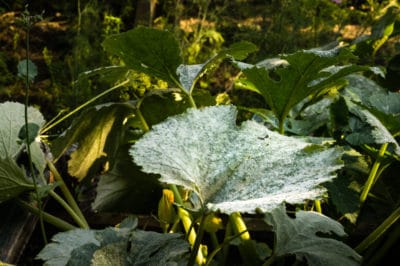What to look for
If you suspect your plants might have powdery mildew, check for these signs and symptoms:
- Waxy white build-up, resembling soap scum on the leaves
- Pale discoloration that may rub or wash away
- Wilting or yellowing
- Few blossoms and fruits
- Rarely, plant death
Only very severe cases of powdery mildew tend to be fatal to plants, but it does impact your plant’s health and thus the number of fruits it will produce in a given season. For the biggest harvest possible, it’s best to try to prevent powdery mildew, and to treat it quickly if it does arise.
Preventing powdery mildew
There are many simple tips and tricks for keeping this disease away from your plants. Many of them have the added benefit of making your zucchini plants easier to care for and harvest, since the main goal is to increase airflow around the plants and prevent the wet, humid environment that helps the fungus thrive.
Always water plants at ground level. Not only does this prevent fungus from getting a foothold on the leaves, but it also makes sure that more of the water ends up in the soil, rather than evaporating uselessly into the air. Drip irrigation lines or soaker hoses provide the same ease of use as sprinklers, but without increasing the risk or powdery mildew.
Another way to help your zucchini avoid disease is to grow them on trellises or to prune back extra leaves on the plants to increase airflow. This has the added benefit of making the plants easier to harvest, especially if the variety you choose is spiny-stemmed.
Treatments
If your zucchini plants have powdery mildew, you have a variety of treatment options. Copper fungicides are minimally toxic and effective against powdery mildew spores, killing off the infection and keeping it from spreading.
Neem oil, made from the neem tree native to India, is effective against a wide variety of pests and diseases, including powdery mildew. It’s an especially good option if you’re also seeing insect damage on your weakened plants.
Though plenty of treatment options are available, many gardeners have excellent luck with preventative measures. Now that you know what to look for, your zucchini plants can stay happy and healthy all season long.
